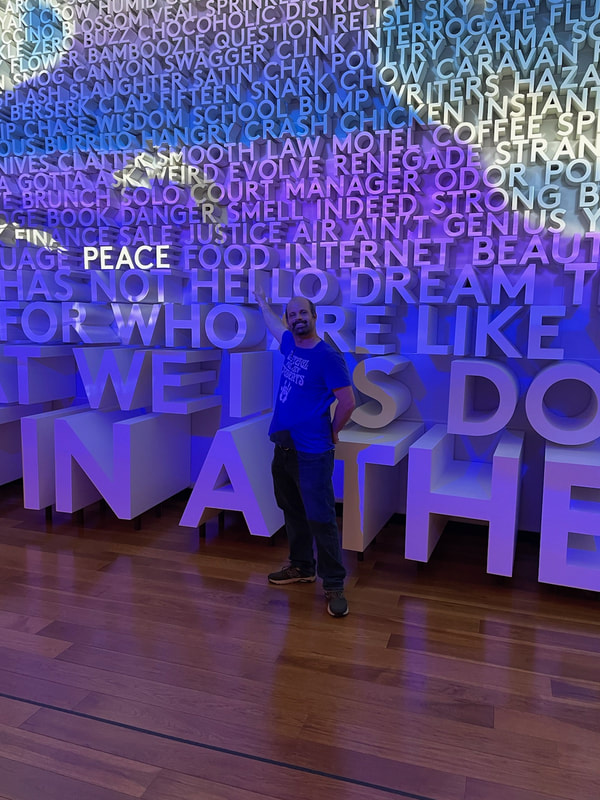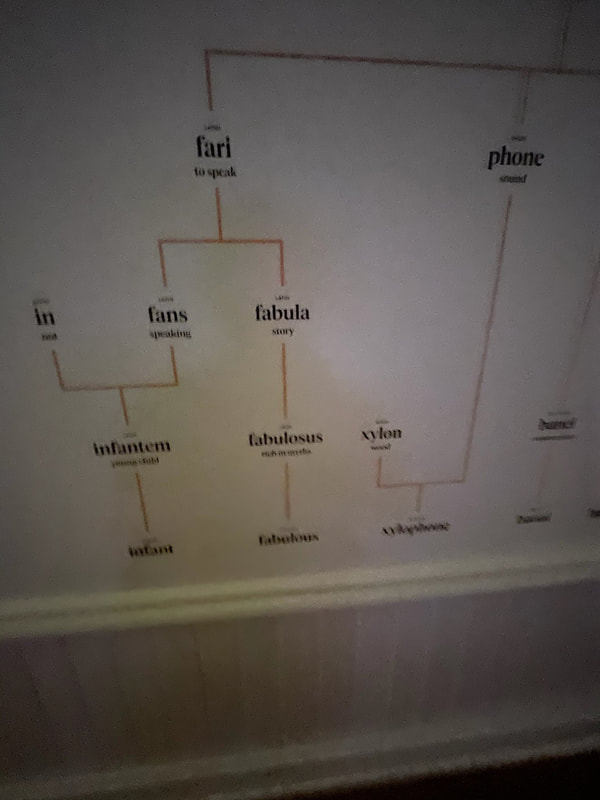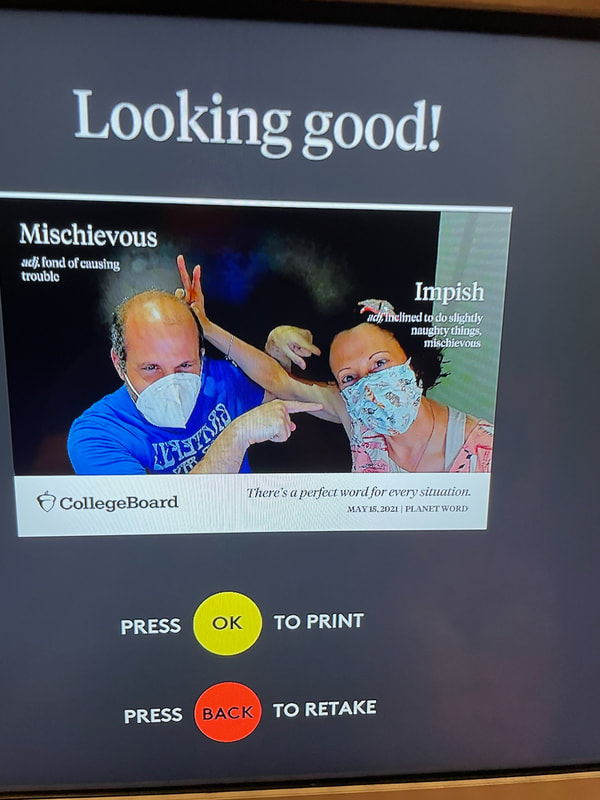|
I could barely sleep last night. The excitement of going to Planet Word with my good friend Heather was too much to bear, particularly after my Saturday pandemic routine of jogging, biking, hiking, napping, playing with Chester, and take-out (which is actually a pretty fun routine). But somehow I made it, and I made it to the museum. Heather and I waited on a socially distanced line (and behind us was a woman named Sheila, who we found out later is a member of CoSP! Small world!). After we got in, the first place we went to was this interesting word wall. You could speak into a microphone, and you’d hear the stories of the origins of some of the words. The wall opposite that had more origins. Heather and I, both devoutly childfree people, spotted the words “infant,” “fabulous,” and “banal” and “Infants are not fabulous; they’re banal.” (No offense to our parent friends on here). From there, we participated in a virtual interaction where we got to learn some words commonly used in other countries. Apparently, kediler means “cats” in Turkish. Heather and I both love our kediler! We also got a cool picture of me being “mischievous” and Heather being “impish.” And, of course, us holding cardboard cutouts of our favorite creatures: cats. Once in the room full of classic books, we separated for a bit. I watched videos on the rhythm of poetry and was transported back to a course I took during my Master’s program at SUNY New Paltz with Dr. Robert Waugh where I learned all about poetic devices such as iambs, trochees, and dactyls (the latter of which are used in rap music). Next up was a video on corpus analysis of text, which is why whenever I type the works “picks self up,” my phone automatically gives me the option of autoentering “from floor,” and then “wipes tear,” and finally, “from eye.” Heather checked out the karaoke room starring Neil Diamond, which, as I type, I now regret not seeing. But, hey, I can always go back. I made us a reservation at this lovely Mediterranean restaurant called Zaytinya, but we had more time than I thought we would before the reservation, so we walked around and talked. At Heather’s encouragement, I continued to say, “Hellwoooo Chester” to every dog that passed (but not every baby; that would be banal). Heather even said, “that’s a cute Chester,” about one dog, about which I commented on her use of metonymy. She also informed me about “evil eyes,” which were on the restaurant’s website, and she texted me about them yesterday. She had sent a picture of her cat/son Raven, so I thought she was referring to his eyes (Chester can also make some pretty intense eyes when he wants to). Evil eyes; I’d love to be able to use it on a few people, but I digress. We enjoyed some awesome cuisine. Heather got the Falafael, while I sampled an omelette horitaki, and we split some Brunch Fries. Mmmmmm… We talked words, people who will eat McChickens and hot dogs but won’t get the vaccine because they don’t know what’s in it, gas hoarders, people who need to get permission from their spouses to drink soda, old-world Jewish culture, and other fun topics. We parted ways at about 1, and when I got home, I sampled Smarties (not that tart candy, but a British version of M&Ms). I dug ‘em, for sure. Thanks, Heather! And, as always, I enjoyed our banter. Word to your Raven!
0 Comments
(This paper was written by Laender Manzano, a student in my IGED111: Foundational Writing in the Natural and Social Sciences course at the University of the District of Columbia, in the Spring 2021 semester.
Singlism. Eight simple letters. I can bet my last dollar many of you reading this have never heard of this term. I bet you now are asking yourself, “what is singlism?” For those of you who have heard of this term, I can bet you never gave it any thought. In recent times, the term singlism has been a topic of controversy. The one thing that is not up for debate is how undoubtedly singlism is a form of discrimination. Before making any judgment, let us start off with what is Singlism. Singlism is a recently created word. The word is claimed to have been created by the well-renowned social psychologist Bella DePaulo Ph.D. DePaulo (2010) defines singlism as “the stigmatizing of adults who are single. It includes negative stereotyping of singles and discrimination against singles.” One would believe the creator of the word would be able to provide the most accurate definition, and yet, the term continues to be debated. One aspect that has led to the growth of the term is the evolution of society: specifically, relationships. Take a trip down history street and picture a man in the 1930s having dinner after a long day of work. Is he eating alone? Be honest. Let me help you; you just pictured a man arriving home after a long day at work and meeting his wife and kids at home. The reality is that this is what Americans have been taught. The norm for a person is to be married. Take a U-turn and return to the present time and picture a man after a long day at work eating dinner at home. Is he eating alone? Is he eating with a roommate? Is he eating while the dog watches on the side? Whether society would like to admit it or not, the norm and averages of relationships have changed. According to Emily Guskin and Lisa Bonos (2019), “Just over half of Americans between the ages of 18 and 34 — 51 percent of them — said they do not have a steady romantic partner.” This brings us to the topic of singlism. The rise of Americans being single has led to an increase in encounters with singlism. Truth be told, the more singles exist in society, the more common singlism becomes. Now more than ever do people come across singlism. It happens at our jobs, schools, courts, and even amongst our friends and family. For instance, singles are looked down on when they reach a certain age and are still single. Why is that you may wonder? Simply put, we have been programmed that to have a successful and happy life, people must find their second half as if we are born missing half of ourselves. Moreover, singles are commonly seen as sad, stubborn people. The assumption that people are single as a result of their behavior rather than being a choice is mindboggling. For generations, being single has been depicted as a punishment for one’s lack of social skills. In her book, Depaulo (2007) cancels this fallacious mindset and informs the reader, “the attributes are pathetic, and they can all be found among people of every type of living arrangement and marital status.” Singlism is a result of fallacious beliefs that some people in society seem to continue to hold onto. Remember, a person’s relationship status does not determine who that person is. One would think that in an everlasting, evolving society, the laws, rules, and regulations would also adapt. Unfortunately, that is not the case. In the case of Americans, we continue to see singles being at a disadvantage compared to those who are married. For example, the Social Security Administration has a site dedicated to benefits specifically to spouses. Singles without considering anything else, are immediately disqualified from these benefits. Let us not overlook the fact that the government rewards you for being married. H&R Block (2019) informs the reader how “the most common credits and deductions are unavailable on separate returns.” Imagine a colored person paying less in taxes because of his skin color. Would that be discrimination? I once again ask how singlism is any different from racism. In both scenarios, a person has been deprived of benefits due to being categorized within a group of single people. Singlism, now more than ever, has proven itself to be a form of discrimination. If you, like many minds in our society, think otherwise, I will kindly ask you to switch places with the counter. For instance, if you are white, would you like to be treated as a black person? If you are a Christian, would you like to be treated as a Muslim? If you are a person from a wealthy family, would you like to be treated like someone from a lower class? If you were married, would you like to be treated as a single person? If you answered no to any of the previous questions, then you too can agree that singlism is a form of discrimination. Although silent and unspoken, it continues to persist in our society. As with any other form of discrimination, individuals and their efforts are the crucial to making a change for the greater good; with that said, what will you do? References DePaulo, B. (2010, September 20). Singlism: What it is and is not, and why it should be in the dictionary. Retrieved February 16, 2021, from https://www.psychologytoday.com/us/blog /living-single/201009/singlism-what-it-is-and-is-not-and-why-it-should-be-in-the-diction ary DePaulo, B. (2007). Singled out: How singles are stereotyped, stigmatized, and ignored, and still live happily ever after. In Singled out: How singles are stereotyped, stigmatized, and ignored, and still live happily ever after (p. 95). New York, NY: St Martin's Griffin. Guskin, E., &; Bonos, L. (2019, March 22). It's not just you: New data shows more than half of young people in America don't have a romantic partner. Retrieved February 16, 2021, from https://www.washingtonpost.com/lifestyle/2019/03/21/its-not-just-you-new-data-shows-more-than-half-young-people-america-dont-have-romantic-partner/. Married filing jointly vs. married filing separately. (2019, December 03). Retrieved February 16, 2021, from https://www.hrblock.com/tax-center/filing/personal-tax-planning/married-filing-jointly-vs-separately/. |
AuthorMy name is Craig. I'm an educator, writer, and unapologetic singleton. When not reading, writing, or teaching, I enjoy hiking, running, watching movies, going to concerts, spending time with friends, and playing with my cat/son, Chester. Archives
July 2024
Categories |





 RSS Feed
RSS Feed
